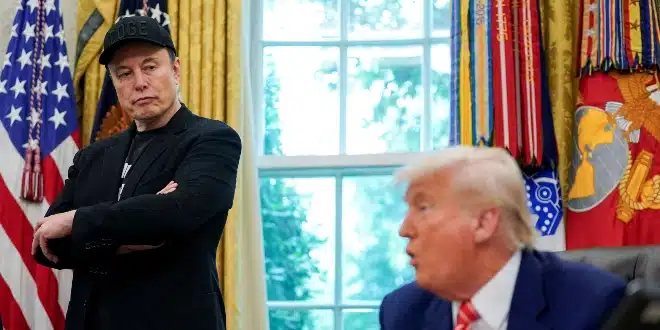The alliance between President Donald Trump and tech entrepreneur Elon Musk, once a formidable force in American politics, has deteriorated into a public and contentious dispute. Their relationship, which began with mutual support during the 2024 presidential campaign, has unraveled over disagreements on fiscal policy and governance.
In the aftermath of an assassination attempt on Trump in July 2024, Musk publicly endorsed the president, marking the beginning of their political partnership. Musk’s support extended beyond endorsements; he contributed over $250 million to Trump’s campaign and was appointed to lead the newly established Department of Government Efficiency (DOGE). In this role, Musk aimed to streamline federal operations and reduce government spending.
Musk’s tenure at DOGE was marked by aggressive cost-cutting measures, including significant layoffs and restructuring of federal agencies. However, his approach faced criticism for its impact on public services and the accuracy of reported savings. By May 2025, Musk resigned from his position, citing frustrations with bureaucratic inefficiencies and policy directions.
Divergence Over Fiscal Legislation
The rift between Trump and Musk widened with the introduction of the “One Big Beautiful Bill,” a comprehensive tax and spending package proposed by the Trump administration. Musk vehemently opposed the bill, labeling it a “disgusting abomination” and criticizing its potential to exacerbate the national debt. He argued that the legislation contradicted the fiscal responsibility efforts he championed at DOGE.
Trump responded by accusing Musk of personal grievances, particularly over the reduction of electric vehicle tax credits, which affected Tesla. The president suggested that Musk’s opposition was driven by self-interest rather than genuine policy concerns.
Escalation and Economic Implications
The conflict escalated as Trump threatened to terminate federal contracts with Musk’s companies, including Tesla and SpaceX. Musk retaliated by hinting at the decommissioning of SpaceX’s Dragon spacecraft, a critical component of NASA’s operations. Although Musk later retracted this threat, the exchange highlighted the fragility of their alliance.
The feud had immediate economic repercussions. Tesla’s stock experienced a significant decline, erasing approximately $150 billion in market capitalization in a single day. This downturn prompted investors to redirect their focus toward emerging markets, notably India’s growing electric vehicle sector.
Political Ramifications and Future Outlook
Beyond economic impacts, the dispute has influenced political dynamics. Musk conducted a poll on his social media platform, X, gauging support for the formation of a new political party representing centrist views. The poll indicated substantial backing, suggesting potential shifts in the political landscape.
Despite the public nature of their disagreement, there are indications of possible reconciliation. Reports suggest that White House aides have arranged discussions between Trump and Musk to address their differences. The outcome of these talks remains uncertain, but their resolution could have significant implications for both political and economic spheres.
The deterioration of the Trump-Musk partnership underscores the complexities of alliances between political leaders and influential business figures. As both individuals continue to wield considerable influence, the trajectory of their relationship will likely shape future policy decisions and market trends.


